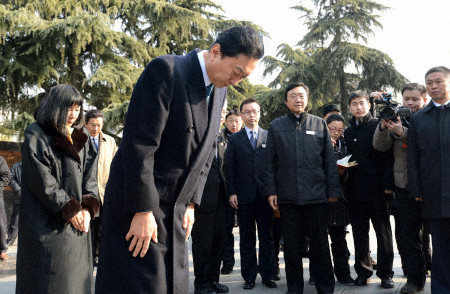China Feature: Week in Review --- From A Dispute With Japan to A Japanese Apology (Lin)

Isabel Lin summarises the latest developments inside China:
China Objects to US Comments in Diaoyu Islands Dispute
Chinese Foreign Minister Qin Gang said on Sunday that Beijing is "firmly opposed" to comments made by US Secretary of State Hillary Clinton about China's dispute with Japan over the Daioyu Islands.
At a joint news conference last Friday with Japanese Foreign Minister Fumio Kishida in Washington, Clinton said the US does not take a position on the ultimate sovereignty of the islands. However, she added --- without saying "Sankaku Islands", the title used by Tokyo --- that that they were under the administrative authority of Japan and that the US opposes any unilateral actions to undermine Japanese authority over the area.
Foreign Minister Qin responded, "We urge the U.S. side to adopt a responsible attitude in regard to the issue of the Diaoyu Islands. It should be careful with its words, and act and maintain regional peace, stability and the general situation of China-U.S. relations with practical actions and build credit with the Chinese people." He added,"The comments by the U.S. side are ignorant of facts and indiscriminate of rights and wrongs."
The dispute over ownership of the Daioyu Islands started more than a hundred years ago, when China's Qing Government was defeated in First Sino-Japanese War and,was forced to sign the Treaty of Shimonoseki in 1895. The tension has been fuelled by the discovery of abundant oil resources in the area in the late 1960s.
Former Japanese Prime Minister Apologises for Wartime Crimes in China

Yukio Hatoyama (front) and his wife bow as they mourn for the victims of the Nanjing Massacre, 17 January
During his private visit to China last week, former Japanese Prime Minister Yukio Hatoyama apologised for Tokyo's wartime crimes in China and expressed his hope that they would not be repeated.
Hatoyama led Japan between September 2009 and June 2010. He is the third former Japanese Prime Minister to visit the memorial of the victims of the Nanjing Massacre.
Noting the memorial's inscription, "To Remember the Historical Lesson of Nanjing, But Not for Revenge, and To Seek Eternal World Peace for Great Love." Hatoyama said the words touched him and that he hoped all people will work hard for peace.
As the former Prime Minister signed a long paper scroll in the Memorial Hall, he slightly altered one character in his first name so that it had the sound and meaning of “Friend”. He also planted a ginkgo tree in a park and said he would returned after the tree blossomed and bore fruit.
Hatoyama had declined a Chinese invitation to visit in September 2012.
Communist Party Flagship Newspaper Told: Improve Your Reporting
The publicity chief of the Communist Party, Liu Qibao, has inspected the Party's flagship newspaper, the People's Daily, and told it to "improve its reporting style".
Liu said media organizations should be innovative to boost the credibility and influence of their articles. he said the People's Daily should strive to win readers by carrying editorials addressing people's concerns.
y.The People's Daily has complemented its print version with a micro-blog, launched in July, that now has more than 3.7 million followers.
Liu's comments follow this month's censorship dispute over the leading paper Southern Daily. Party officials ordered it to remove a New Year's editorial calling for attention to corruption. The Party response led to a strike by the paper's journalists and the removal of the editor-in-chief.
Scientists Awarded State Scientific and Technological Award
Zheng Zhemin, an explosion mechanics expert, and Wang Xiaomo, a radar engineer, won China's top science award of 2012 last Friday.
Zheng, 88, has devoted himself to research in the areas of elastic mechanics, explosive processing, and underground nuclear detonations. Wang, 74, has engaged in radar-related research and design for the past 30 years. He is regarded as the "father" of aerial warning and control systems in China.
Premier Wen Jiabao said the government will devote more resources toward science and technology for China's long-term development. He declared that the government will create that encourages creativity and initiative among scientists and researchers.
Awards were also bestowed on other scientists and scientific research programmes. Chemist Richard N. Zare from the US, along with four other experts from America, Canada, Denmark and Japan, received the International Cooperation Award in Science and Technology.
The Hot Product: "Sleep Support" for Railway Journeys
"Sleep Support" is a hit on China’s online marketplace Taobao. The invention markets itself as a must-have during long train journeys.
However, doctors are advising people not to rely solely on the support, as bending the head and chest forward for a prolonged period is not natural for the body. A physician said, "It may cause stress to the neck, especially for those who already suffer from neck problems. Excessive bending of the neck might also cause other health problems."
Near the end of Chinese lunar year, as hundreds of millions travel during the Spring Festival, many people have to endure crowded, delayed transport. Sitting in a train for 20 hours is not uncommon for those who cannot afford the much faster but expensive bullet train --- and they are luckier than those who cannot get tickets home.
This year’s Festival is 10 February, with the peak in travel expected to begin on 26 January 26th. China’s railways are expecting 225 million passenger trips during the 40 days around the Festival.

 Friday, January 25, 2013 at 9:07
Friday, January 25, 2013 at 9:07
Reader Comments